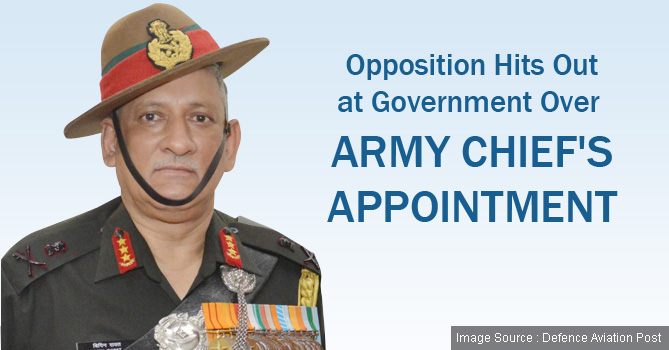The Indian political landscape has witnessed more slugfests in about 7 decades of independence than can be imagined. Political outrages have, however, peaked ever since the NaMo led NDA took over the reins of the central government in 2014. The scenario now, continues to deteriorate. The latest controversy surrounds the appointment of Lt. Gen. Bipin Rawat as the new Army Chief.
On Saturday, 17 December, 2016, the government announced the appointment of two new service chiefs. Lt General Bipin Rawat shall succeed outgoing Chief of the Army Staff (COAS) General Dalbir Singh Suhag who is set to retire on 31 December 2016. The government also announced the appointment of Air Marshal Birender Singh Dhanoa as the next Air Force Chief when Air Chief Marshal Arup Raha retires from office on 31 December 2016. Air Marshal Dhanoa is known to be a daring pilot who served the country by undertaking many arduous missions. An RIMC and NDA alumnus, Dhanoa flew a number of night strike missions during the Kargil war.
New COAS Appointment
If there has been one institution that has remained largely apolitical and firmly committed to the practice of democracy in the country, it has been the Indian Army. The appointment of a new Army chief has always been a keenly awaited event. Not only is the appointment followed closely by Army personnel, it is also followed by the defence and political analysts of the country, and indeed closely watched by our neighbouring countries.
This time, though, there has been an unprecedented delay in the announcement of the incoming COAS. It is the central government’s prerogative to announce the appointment and the naming of the COAS (which is usually made 2-3 months in advance) had been left to the final fortnight of General Dalbir Singh’s tenure triggering much speculation. On Saturday, the government announced the appointment of the new Army Chief and it is now clear that Lt Gen Bipin Rawat shall take charge of the office in 2017.
Lt Gen Rawat’s Credentials
Lt Gen Rawat was commissioned in the Fifth Battalion of the Eleven Gorkha Rifles from the Indian Military Academy (IMA), Dehradun, in December 1978. Here he was awarded the Sword of Honour, an honour accorded to the cadet with the best overall performance in any batch. Lt Gen Rawat has well over a decade of experience in dealing with counter insurgency operations along the LoC in Jammu and Kashmir, in the rugged north east, and the LoAC (Chinese front). He has proved himself a dynamic leader by looking after both deployment and operations in combat areas. He also headed a brigade in the Democratic Republic of the Congo (UN peacekeeping operation) in 2008. He was the General Officer Commanding-in-Chief, Southern Army Command, before his appointment as Vice Chief of the Army.
Political Controversy
In what is generally considered an unwritten dictate, political parties of the country have hitherto refrained from commenting on the internal matters of the armed forces. This includes the government’s decisions to make service chief appointments. The COAS appointment has brought political criticism and controversy to the forefront, though.
In appointing Lt Gen Rawat, the government pointed ignored the principle of seniority. Lt Gen Praveen Bakshi, who heads the Eastern Command and Lt Gen PM Hariz , who heads the Southern Command have served longer than Lt Gen Rawat.
The Congress party has risen up to sharply criticize the government. Questioning the PM’s decision to ignore the principle of seniority, Manish Tiwari (Congress leader) tweeted, “Why has Seniority not been respected in Aptt.of Army Chief?Why have Lt Gen PRAVIN Bakshi & Lt Gen Mohamed Ali Hariz been superseded Mr PM?” Tewari also tweeted that Lt Gen Rawat is “not third but fourth senior most. Even Lt Gen BS Negi army commander Central Command is senior to him”.
Apart from the Congress, Left party leaders such as CPI politician D Raja also hit out at the government, terming the appointment ‘unfortunate’. “Appointments in the army have become controversial“, said Raja.
Not Unprecedented
While the Congress has been the loudest in criticizing the government’s motives, supersession or appointment of a service chief over a senior officer is hardly unprecedented.
In 1972, the Congress government, with Indira Gandhi at its helm, decided to side-step Lt Gen PS Bhagat who was expected to be the successor of General Sam Manekshaw and gave his junior officer General GG Bewoor an extension of service allowing him to succeed Manekshaw. This was despite the fact that Bhagat was very popular and well respected and was a Victoria Cross awardee.
In 1983, the Congress government, led by PM Indira Gandhi chose to appoint Lt Gen A.S. Vaidya as the COAS over senior officer, Lt Gen S.K. Sinha. The latter then resigned in June 1983.
Similarly, in 2014, Vice Admiral Robin K Dhowan was appointed as Chief of Naval Staff (CONS) after the abrupt resignation of Admiral DK Joshi. Admiral Dhowan’s appointment (by the Congress government) was the supersession of Western Naval Command Chief Vice Admiral Shekhar Sinha who was senior to Dhowan by about six months. In fact there have been a few other instances of supersession in this fashion.
Expertise in Surgical Strikes
The government has defended Lt Gen Rawat’s appointment on the grounds that he is one of the most experienced and capable candidates for the office. His “outstanding” track record in handling operations has been taken into consideration, said the government. Lt Gen Rawat was given operational responsibility for conducting the cross-border surgical strikes undertaken by the NDA government in Myanmar (in retaliation to Naga insurgency in Manipur). He also oversaw the surgical strikes across the LoC in Jammu and Kashmir following the Uri attack, in his capacity as Vice Chief of the Army. It may be his experience and expertise in this area that has now made him the Army Chief-designate. Master of surgical strikes, as he is known, Lt Gen Rawat has proved his mettle in handling “counter-terrorism and counterinsurgency” issues. He is the son of late Lt Gen Lachu Singh Rawat, who also commanded the 5/11 Gorkha unit.
Related Article…
Indian Army – Ranks and Recruitment Process
Interesting Facts About Indian Army You May Not Know
Warfare Scenario: What have Indian Defence Forces got?
The National Security Guard : India’s Second Line of Defense




